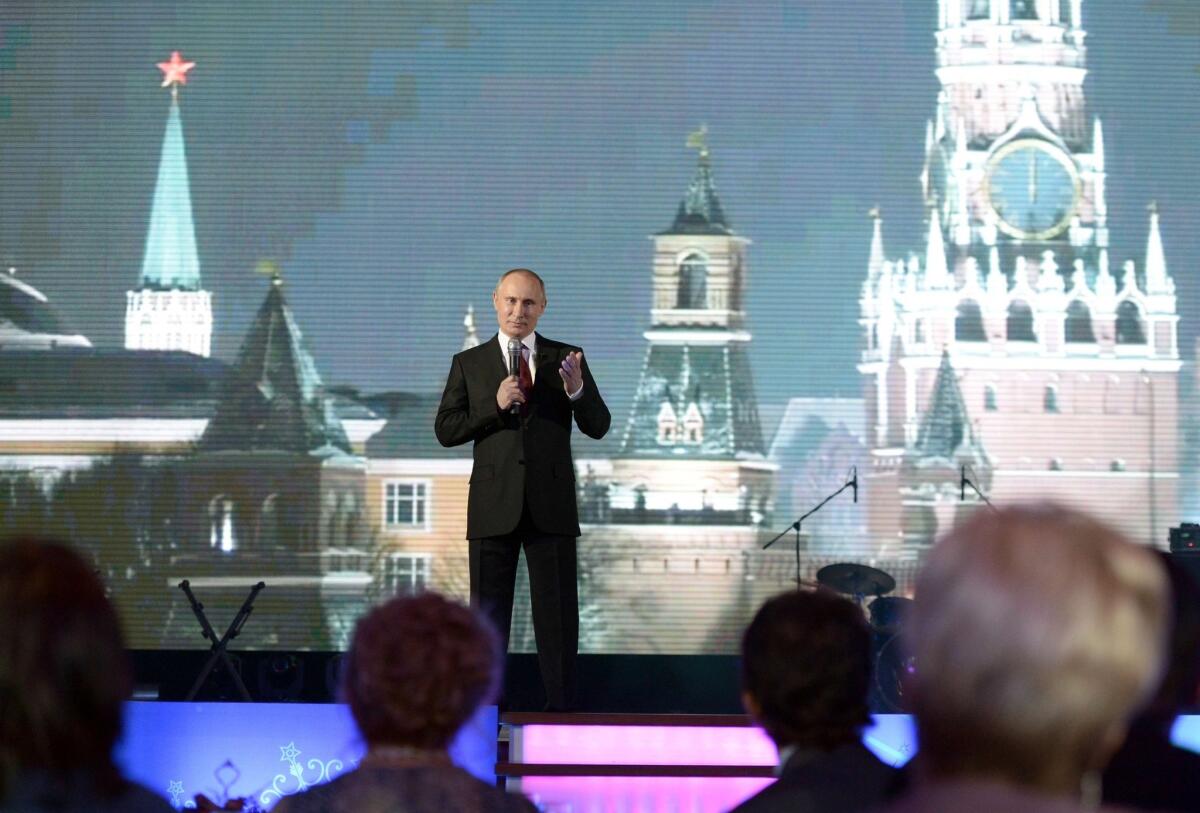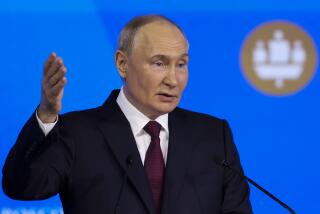Russia’s Putin vows ‘destruction’ of terrorists as Olympics near

Russian President Vladimir Putin vowed in his New Year’s address to fight terrorists “until their total destruction,” his first public comment on twin suicide bombings in Volgograd this week that killed 34 and stirred fears for the safety of athletes and visitors at the Olympic Winter Games.
Putin traditionally gives his annual New Year’s speech from the Kremlin, but this year traveled to the Far East city of Khabarovsk to share the holiday with victims of massive flooding that hit the region in August and September.
“This year we have faced various problems and serious challenges, including the inhumane terrorist attacks in Volgograd and the unprecedented flood in the Far East,” Putin said in the taped address as 2014 began rolling across Russia’s nine time zones. “In such times of hardship, Russia has always been united and cohesive.”
He asked Russians to bow their heads in memory of both flood and bombing victims and declared he was “confident that we will continue to fight against terrorists until their total destruction.”
No group has claimed responsibility for the Sunday bombing of Volgograd’s main train station, in which 18 were killed, or for the 16 fatalities from a Monday suicide attack on a trolley bus. The city formerly known as Stalingrad was celebrated earlier this year for its heroic battle that turned the tide of World War II 70 years ago.
But suspicions have squarely focused on the patchwork of radical Islamic separatist movements in the Caucasus region just south of Volgograd and stretching across the roiling territory between the Caspian and Black Seas.
Vladimir Markin, a spokesman for the Russian Investigative Committee that is the rough equivalent of the FBI, told journalists in Volgograd that examination of the bomb fragments from both blasts this week showed that the shrapnel contents were identical and therefore believed to have been “prepared in the same place.”
Numerous terrorist attacks throughout Russia in the last few years have been traced to Caucasus militants agitating for self-rule in the region of predominantly Muslim people that among other ethnic groups includes Chechens, Dagestanis, Abkhazians and Ossetians.
Doku Umarov, a fugitive guerrilla chief from Chechnya, called on his supporters in July to use “any means possible” to disrupt the Olympic Winter Games in the Black Sea resort of Sochi, Putin’s lavishly financed pet project.
Russia has reportedly spent a record $50 billion to stage the Games, including hundreds of millions on extra security for the seaside resort and mountain event venues just over the range from the site of savage post-Soviet wars between Russian forces and the Islamic separatists.
“Sochi represents a huge test of whether these investments are going to pay off,” Andrew Weiss, vice president for studies at the Carnegie Endowment for International Peace, said of the security forces upgrades bankrolled by Russia’s oil and gas revenue.
The Russian government is promising that security in major cities will be beefed up as a result of the Volgograd attacks, Weiss said.
“That seems eminently sensible, but, of course, there are simply too many potential targets to guarantee that there won’t be further attacks” ahead of or during the Olympics that begin Feb. 7, he said.
International Olympic Committee President Thomas Bach expressed his confidence Monday that Russia will provide “safe and secure Games in Sochi.” China on Tuesday also professed optimism, with Foreign Ministry spokeswoman Hua Chunying telling reporters that Beijing officials “believe that Russia is capable of ensuring security and hosting a successful Winter Olympics.”
In Washington, White House spokeswoman Caitlin Hayden said the U.S. government had offered its “full support” to Russia in preparing for the Games but suggested that Moscow hadn’t responded.
“We would welcome the opportunity for closer cooperation for the safety of the athletes, spectators, and other participants,” Hayden said in statement that condemned the Volgograd bombings and sent condolences to the victims’ families.
Twitter: @cjwilliamslat
More to Read
Sign up for Essential California
The most important California stories and recommendations in your inbox every morning.
You may occasionally receive promotional content from the Los Angeles Times.











